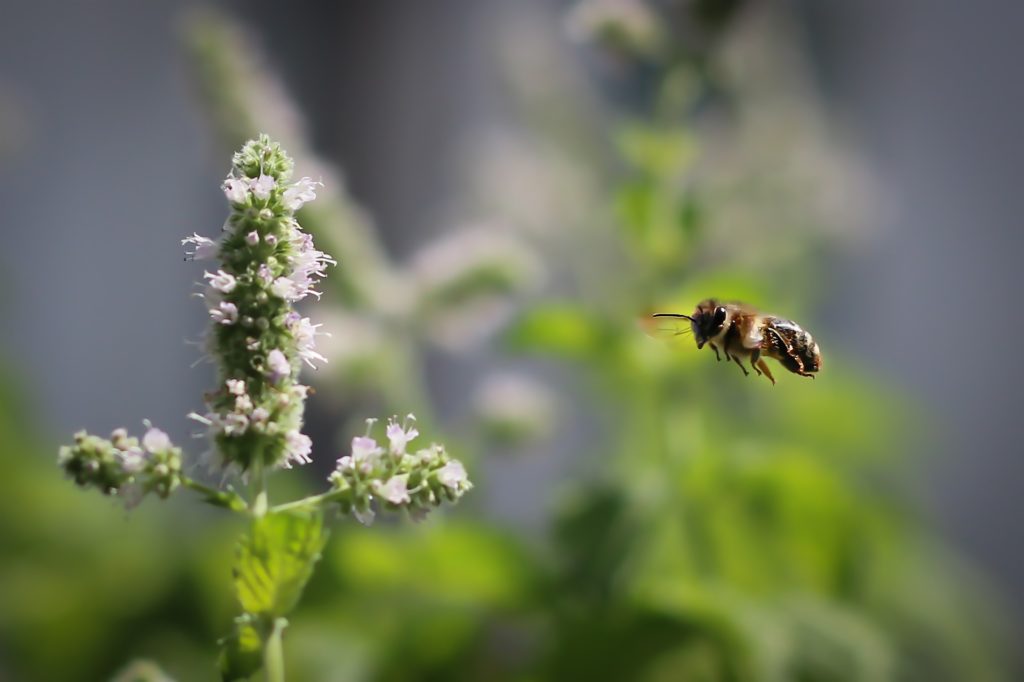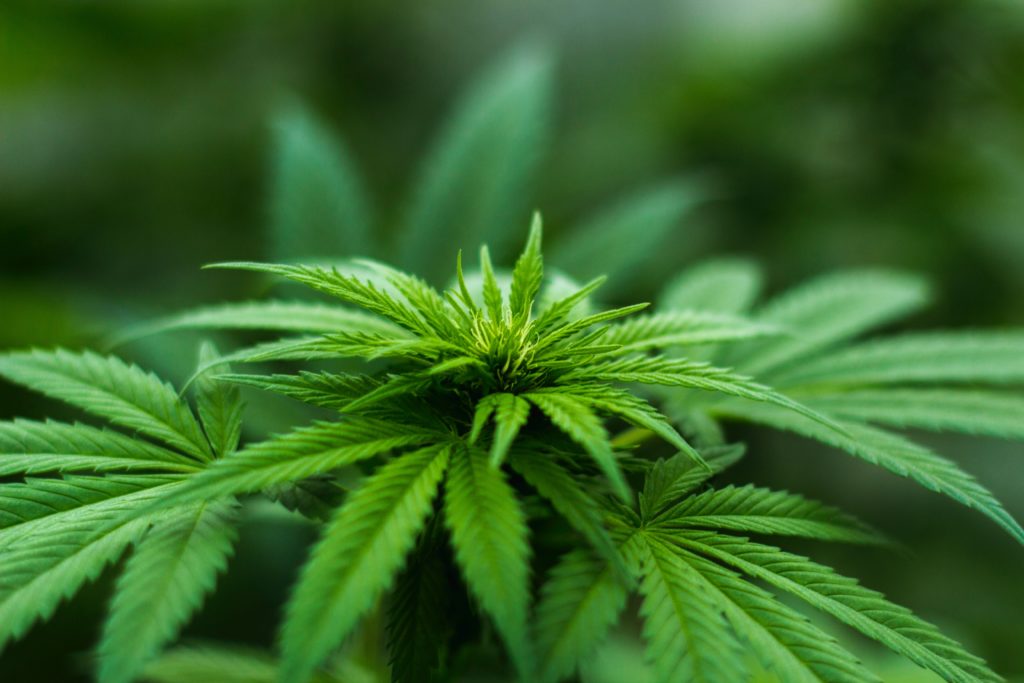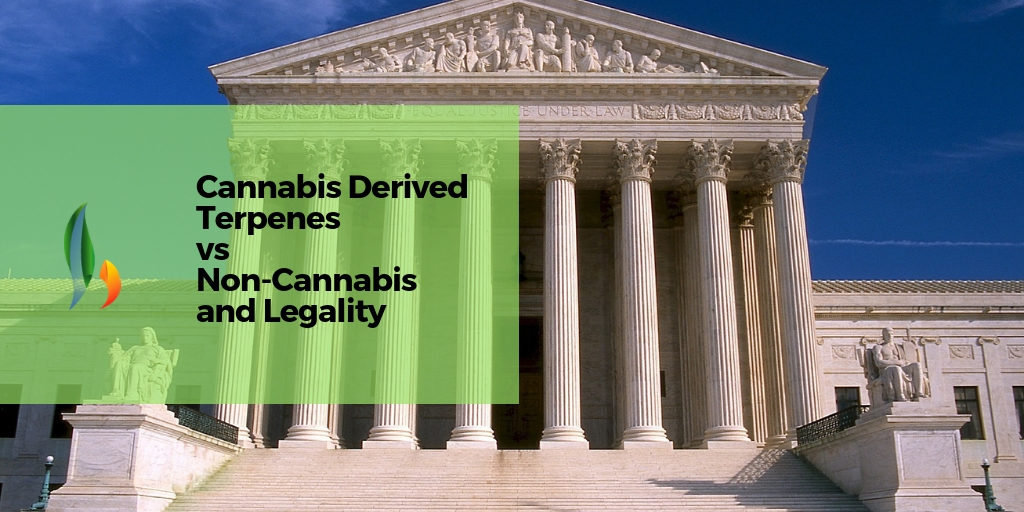What’s the difference between cannabis derived terpenes and non-cannabis derived terpenes when it comes to legality?
In this guide, you’ll learn the differences between these two types of terpenes, including the pros and cons of each and where they both fall in the legal system.
Before we get to the good stuff, let’s start with a refresher on the basics of terpenes first.
What are Terpenes Exactly?
You know how plants and fruit all have different smells and tastes?
You can thank terpenes for that.
Terpenes are found in all living plants; it’s what you can consider the plant’s “essential oils.”
These essential oils are what you’re smelling, tasting, and seeing (in the case of color) in the plant material itself.
Terpenes build plant resin, which is responsible for everything from attracting bugs for pollination to warding off predators hungry for lunch.

And since terpenes can be extracted from plants, you can consume, inhale, or apply them directly to your skin for medicinal benefits and natural relief.
They’re also used to enhance your marijuana experience, if you choose to combine the two.
Different terpenes have different roles to play -- and they also deliver different benefits for your body depending on your usage and strain profile choices.
What are the Benefits of Using Terpenes?
Like essential oils used for aromatherapy, terpenes can be used on their own for therapeutic benefits, such as providing help and relief for:
- Inflammation
- Pain
- Stress
- Depression
- Anxiety
- Fatigue
- Addiction
- Epilepsy
- Cancer
- Headaches
- Insomnia
- Loss of appetite
- Fungal and bacterial infections
But you can also mix terpenes into marijuana concentrates for inhalation.
Certain terpenes have been shown to bind to specific cannabinoid receptors, just like THC and CBD, to enhance the effect of cannabis on your body.
Known as The Entourage Effect, the benefits of terpenes add to the effects you find using marijuana to create an even better experience.

Terpenes can also lessen the psychoactive nature of the THC in marijuana for a more mellow high. But keep in mind that other terpenes can actually intensify these effects too.
For more detailed information about what terpenes are and how to use them, check out this guide later.
Fun fact: There are just over 100 cannabinoids in marijuana, but over 200 various terpenes in the cannabis plant[*].
These terpenes are actually located in the same part of the marijuana plant where cannabinoids like THC and CBD are also produced.
While cannabinoids are odorless and tasteless, it’s these terpenes that give each marijuana strain its unique smell and flavor profile.
And this is also why you’ll find terpenes on the market sourced from both cannabis and non-cannabis plants.
The Differences Between Cannabis Derived and Non-Cannabis Derived Terpenes
In the same way essential oils like lavender or eucalyptus are extracted from their respective plants, so too can terpenes be extracted from the plants which make and house them.
Companies now have the technology to identify and isolate terpenes in plants and fruits and then extract only the individual terpenes they’re looking for.
This means specific terpenes can be used for specific therapeutic needs.
As we mentioned, there are two main categories of terpenes:
Cannabis derived
Non-cannabis derived
So let’s break down their differences next.
The Pros and Cons of Cannabis Derived Terpenes
Cannabis derived terpenes are extracted and sourced directly from cannabis plants, which, as you’ll learn later in this guide, effects their legal classification.
Terpene enthusiasts say cannabis-based terpenes give off a “more synergistic” Entourage Effect since you can match specific terpenes from the same plant strains and use them together as one.
It’s been said that these terpenes allow you to actually taste the plant during inhalation.
However, there are several downsides to enjoying this flavor and aroma.

Cannabis derived terpenes are harder to source because they have to go through a complicated extraction process.
Extractors also get very little product for such a time consuming process, which means...
Terpenes derived from cannabis cost more for consumers. All these additional labor hours for a small supply of product raises the price for everyone.
Cannabis derived terpenes have greater inconsistencies too, since they’re taken from different plants and strains each time.
There isn’t much standardization with this process so you may end up with something you don’t like the second time around.
Finally, cannabis derived terpenes can be harsh and irritating when you vaporize them because they sometimes contain moisture or traces of water that naturally occur in the plants.
Now compare this list of advantages and disadvantages with those of non-cannabis derived terpenes.
The Pros and Cons of Non-Cannabis Derived Terpenes
There are two types of non-cannabis derived terpenes:
- Synthetic terpenes, which are not sourced from actual plants and are instead created in a lab using chemical ingredients.
- Natural terpenes, which are extracted from the actual plant or fruit material.
You can find natural non-cannabis derived terpenes that are identical to terpenes you’ll find in cannabis, such as:
- Limonene in lemons
- Pinene in pine
- Citronellol in oranges
- Linalool in thyme and lavender
- Humulene in hops and sage
There are several benefits to choosing non-cannabis derived terpenes, such as:
There are no known psychoactive effects. This makes the health benefits more attainable for a wider population who may not enjoy this aspect of marijuana.
Non-cannabis derived terpenes also cost less because the terpenes can be sourced in bulk.
It’s also less expensive for manufacturers to create non-cannabis derived terpenes because the process is much easier. This means you don’t have to spend a fortune to get the relief you need.
The lower overhead of non-cannabis derived terpenes also allows for more research and development so the process and the results continually improve.
Non-cannabis derived terpenes are just as effective as those derived from cannabis plants, again because they’re the same.
For example, beta-caryophyllene, one of the most popular terpenes in marijuana, is also commonly found in oregano, black pepper, clove, rosemary, and other plants[*].
Non-cannabis derived terpenes can also bind to cannabinoid receptors, create more receptors, and even make the cell membranes of those receptors easier for cannabinoids to get inside (aka work better).
Aside from flavor, this is the main reason why marijuana users choose to elevate their experience with terpenes.
Plus, the steam-distilling process is standardized so you not only get pure, high-quality terpenes, you’re also guaranteed consistent batches so you can rely on them for the therapy you need.

There are only two downsides to non-derived cannabis terpenes -- and they’re not huge deal breakers for most:
Non-derived cannabis terpenes don’t taste or smell like cannabis, because they’re not extracted from cannabis.
Though the terpenes are identical, the exact smell and flavor will be slightly different when you use them together because the plants are not the same.
They may have a stronger flavor, which again, depends on how you plan to use your non-cannabis derived terpenes.
The biggest difference when it comes to cannabis derived versus non-cannabis derived terpenes all boils down to legality.
Are Terpenes Legal?
Since terpenes extracted from cannabis plants fall under the category of marijuana, cannabis derived terpenes are considered illegal on the federal level.
However, cannabis derived terpenes are legal in states with recreational marijuana (and certain medical marijuana states).
Here’s the good news: non-cannabis derived terpenes are legal in all 50 states.
That’s because while these terpenes may be the same found in cannabis plants, they’re not made from cannabis plants but from plants which are legal, like herbs and fruit.
